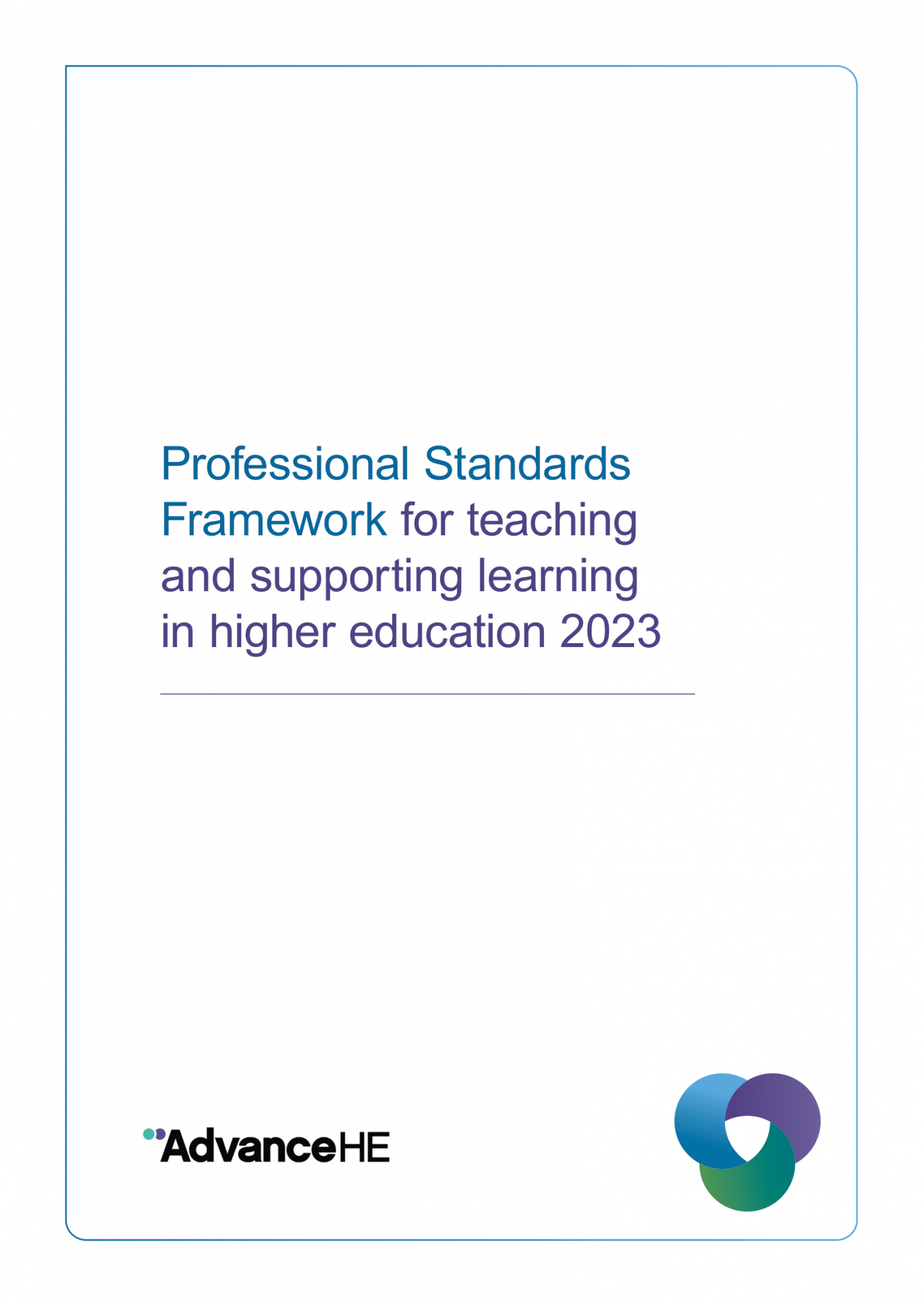
We accredit continuous professional development (CPD) programmes for teaching and learning which are delivered by higher education providers around the world.
Accreditation is the process we use to confirm that these opportunities for professional development offered by institutions are aligned with the Professional Standards Framework (PSF).
PSF is the standards framework for the teaching and learning sector in the UK. Accreditation is a ‘badge of quality’ that can be applied to CPD programmes at an individual or institutional level. It requires institutions to embed the PSF within policy and strategy. It is a recognition of quality and indicates a clear commitment to the enhancement of teaching and learning.
CPD programmes can be accredited against one or more of the four ‘descriptors’ of the PSF. This means that successful participants will be eligible for one of the four categories of fellowship:
Professional Standards Framework 2023
Find out more about the revised framework that emphasises effectiveness and impact, inclusion and context, as fundamental aspects of practice.
Introducing the Professional Standards Framework 2023 (PSF2023)
Launched in 2006 and last revised in 2011, the Professional Standards Framework for teaching and supporting learning in higher education (PSF) has global recognition for raising the profile of teaching and learning in higher education. The PSF’s contribution to reward and recognition is unsurpassed, being used by individuals, institutions and national bodies.
Following a sector and evidence led review, the PSF 2023 is a more inclusive Framework that recognises the critical role of the context in which practice takes place and is more accessible to all professionals with a role in teaching and supporting learning.
Its focus on effectiveness and impact of practice drives attention to improved outcomes for learners across the global community. The concise, streamlined approach offers clarity and ease of use in professional development, leadership of teaching and learning, strategic enhancement and in fellowship and accreditation settings.
We opened the applications for fellowship for each of the four categories supported by the PSF 2023 on 12 April 2023, new guidance documents and templates are available also available from 1 March 2023.
We will continue to welcome applications made against PSF 2011 until 31 December 2023 for individuals already in the process of developing their application.

Advance HE Membership
Advance HE membership includes a Teaching and Learning Accreditation package with access to the accreditation review that can result in the award of the accreditation. It also includes a range of support to help institutions both enhance their practice and achieve professional recognition for their staff.
This package raises the profile of teaching and learning in your institution, celebrating its importance alongside research activities, demonstrating to staff and students a commitment to the quality of teaching.
An Insight into Teaching and Learning Accreditation - video series
We produced a series of videos to introduce:
- teaching and learning accreditation
- the criteria for teaching and learning accreditation
- guidance on making amendments
- the peer review process.
The benefits of Accreditation
Accreditation accredits higher education institutions initial and continuing professional development (CPD) programmes against the professional standards framework (PSF). Accreditation brings benefits to both academic staff and to higher education institutions by:
- raising the profile of teaching and learning, and celebrating its importance alongside research activities
- providing a structured approach to the development, recognition and reward of staff who teach and/or support learning
- demonstrating to students a measurable commitment to the quality of teaching
- raising the standards of teaching and encouraging good practice
- enabling staff to gain professional recognition for their successful professional practice as an educator
- making it possible to benchmark provision against internationally recognised quality standards
A best practice approach to teaching and learning
The Professional Standards Framework for Teaching and Supporting Learning in Higher Education (PSF23) is a globally recognised framework for benchmarking success within higher education teaching and learning support. The PSF can be applied to professional development programmes at an individual or institutional level to improve the quality of teaching and learning and recognise excellence.
Accreditation provides external and independent confirmation that professional development is aligned with the PSF. Accreditation provides participants on accredited programmes with the opportunity to be professionally recognised through the Fellowship scheme in recognition of their continuing success in teaching and learning support.
Good practice in use of dialogue in accredited schemes – report by Dr Ruth Pilkington
This report, authored by Dr Ruth Pilkington, outlines lessons, issues and recommendations for those using a dialogic route and is illustrated by good practice case studies shared by colleagues leading accredited schemes which successfully use dialogue at Edinburgh Napier University, Ulster University, and York St John University. These exemplars emerge from cycles of implementation, review and enhancement by these academics and provide invaluable insights to guide practitioners.
Accreditation or Approval
Which is right for your institution?
Approval
Approval differs from Accreditation in that it does not automatically result in participating individuals being awarded professional recognition as a Fellow. Approval is external confirmation that a product/resource is aligned to the PSF and therefore may be used as evidence towards an application for Fellowship.
Annual CPD Review
Advance HE requires institutions to complete a brief annual review of all accredited CPD schemes. At present the we do not require an annual review for accredited taught programmes.
We provide a template for this report, which contains data specific to the institution. This personalised template will be sent to institutions during September each year.
These annual reports serve several purposes. They:
- provide a platform for celebrating the positive impact that developmental opportunities offered through accredited provision have made within the organisation
- encourage institutions to evaluate the strengths and areas for further development of their accredited provision to lead to future improvements in the next accreditation cycle
- will be used to inform the opportunities for support and guidance material provided by Advance HE
- will inform the annual visit planning of Advance HE as part of sector wide quality enhancement initiatives
- will help us to identify good practice which we may then be able to disseminate with the wider sector with the permission of the institution concerned.
The 2018/19 Guidance notes are available for accredited CPD scheme leaders and the individualised templates for institutions to complete will be issued by the end of October 2019. This template will arrive attached to an email from the CPD Review mailbox cpdreview@advance-he.ac.uk. The template will be pre-populated with data for the individual institution related to award of Fellowship through the accredited CPD provision. At this stage we are not introducing a requirement for a review of accredited credit-bearing provision (e.g. post graduate certificate).
Success rates in accredited CPD schemes
In addition to qualitative commentaries from institutions, the Annual CPD Review 2015-16 also gathered quantitative data related to first application success rates in internal schemes. The ‘Success rates in Accredited CPD schemes’ report provides a summary of success rates across 103 institutions and provides opportunity for comparison with direct application success rates over the same period.
It is hoped that institutions will find this summary analysis of the sector-wide data useful as a benchmark to support interpretation of their own institution’s internal data. Comparison of success data should also support institutions to identify and consider any areas that may benefit from some further development to enhance the operation of accredited CPD schemes and/or enhance support in place for individuals engaging in these internal schemes.
Our Success Data Report is now included in our Annual Review of Advance HE Accredited CPD Schemes 2018-19
Programme of annual visits
In addition to requiring an annual review from institutions with accredited CPD provision, annually we will visit a number of institutions to observe their internal fellowship judgement-making processes. These institutions will be contacted in advance to arrange a visit, although Advance HE reserves the right to request access to the operation of any accredited programmes.
Advance HE will visit a variety of institutions, spread across the UK, with schemes that are already in operation including a mix of those in year one, two and three of the accreditation cycle. These visits will provide the sampled institution with constructive developmental feedback on the operations observed and will inform the opportunities for support and guidance material provided by us. If concerns arise as a result of an institutional visit we will be able to work with the institution in a proactive, developmental manner to ensure that provision operates as explicitly accredited.
